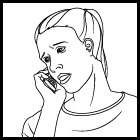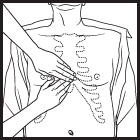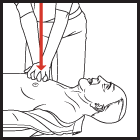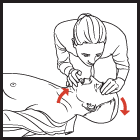Heart-Stopping Sex
"This [sex partners' reluctance to attempt CPR] likely explains the relatively low survival rates despite mostly shockable initial cardiac arrest rhythms."
"It is also recognized that sexual activity may trigger nonfatal acute cardiac events such as myocardial infarction [heart attack]."
Research study: Journal of the American College of Cardiology
"There is plenty of evidence that performing CPR by bystanders until the ambulance arrives translates to significantly better survival for cardiac arrest."
"By definition, a cardiac arrest occurring during sexual activity is witnessed by a partner, and if CPR would have been initiated by the partner this would have been likely to save the lives of some of these [studied] patients."
Aspo Aro, cardiologist, Cedars-Sinai Heart Institute, Los Angeles, study lead author
"There was no data out there to tell them whether their risk is low, medium or high [heart patients' risk of having sex]."
"Here's a situation where you have a captive audience ... I mean, it's tough not to have a partner for sexual activity."
"Maybe the setting was not great and the shock was too much. And, you know, who knows who the partner was -- if it's your spouse, or it isn't. We really didn't study those things."
"[Regardless], clearly we have to increase the awareness of doing CPR, no matter what the circumstances are."
"[For bystanders], just try to get out of your shock and get to it. Here is someone who is a loved one -- all you have to do is put your hands on the chest and put your muscles to work. It increases the chance of them making it out of this whole thing alive."
Dr. Sumeet Chugh, cardiologist, director, heart rhythm centre, Cedars-Sinai Heart Institute
 |
Sex does not pose a significant risk for cardiac arrest, study finds MedicalNewsToday |
One of the issues discussed in group discussions in preparing open-heart surgery patients for resumption of their normal lives post-surgery while still recovering in hospital, is the resumption of sexual activities. And while care is cautioned, patients are generally informed there is no reason not to resume their normal lives in all respects. The issue of potential heart-stopping situations in the post-recovery period or after is not necessarily broached. And likely that is because that potential remains relatively uncommon and doctors do want their patients to realize a full recovery and to maintain their normal lifestyles.
Dr. Chugh, the senior author of this newly published study and his research colleagues, undertook an examination of the records relating to over 4,500 instances of sudden cardiac arrest, to discover that of that total 34 were linked to sexual activity, with 94 percent of that number being male. What dismayed and shocked the doctors is their conclusion that the men's sex partners appeared unwilling to swing into CPR mood and action.
Dr. Aro wrote in the study the observation that sex is not without risk. In a German study of the issue, 0.2 percent of autopsied natural deaths were found to have been linked with sex. Sudden cardiac arrest -- as distinct from a heart attack when blood supply to the heart is stopped or diminished because of a blockage -- occurs when the heart stops beating, abruptly. This represents a "mostly lethal condition" whose result is over 300,000 deaths in the United States annually; between 35,000 to 45,000 in Canada.
Dr. Chugh acknowledges that patients themselves are known to make enquiries about the risk of having sex, but that a dearth of information was available. Which led the researchers to analyze data from the Oregon Sudden Unexpected Death Study, initiated in 2002 and ongoing, representing the largest community-based study involving a population of roughly a million people, in Portland. Past medical history, blood, genetic and allied risk markers from people who "literally drop dead in their homes or anywhere outside hospital" was collected for the study.
The result was to enable the researchers to identify 4,557 sudden cardiac arrests in Portland occurring between 2002 and 2015, of which 34 occurred during or in the minutes after sex with those affected likely on average to be male, middle-aged and with a history of heart disease. One in 100 instances of cardiac arrest in men was found to be associated with sex; the comparable number in women was one in 1,000. And while the absolute risk is taken to be "extremely low", even among the heart disease community, the researchers deplored the finding that the sex partner was loathe to respond.
Men, accounted for 70 percent of all sudden cardiac arrests, and women 30 percent in the cardiac arrests related to sex, so it was concluded that while men appear grossly over-represented, the reason is unclear. The researchers theorized that men might have been using medications, stimulants or possibly had consumed alcohol before sex. Alternately, they might have been more ill, as a result of their heart disease, and as a result, more vulnerable.
The discovery that bystander CPR was performed in 11 heart stoppages involving sex appears a useful explanation for the survival of only six of the 34 people. In August, another study found men to be four times likelier to die from a cardiac arrest if it occurs during sex; French researchers found that these men waited twice as long for resuscitation, spending an average of 8.4 minutes with no assistance, compared to men who experienced a cardiac arrest while involved in sports, walking or gardening, according to the Independent newspaper.
The chance of survival decreases about ten percent for every minute passing without the administration of CPR and defibrillation when an abnormality in the heart's electrical system causes a cardiac arrest.
 CPR IN THREE SIMPLE STEPS
CPR IN THREE SIMPLE STEPS (Please try to attend a CPR training course) |
|
| 1. CALL Check the victim for unresponsiveness. If the person is not responsive and not breathing or not breathing normally. Call 911 and return to the victim. If possible bring the phone next to the person and place on speaker mode. In most locations the emergency dispatcher can assist you with CPR instructions. |  |
| 2. PUMP
If the victim is still not breathing normally, coughing or moving, begin chest compressions. Push down in the center of the chest 2-2.4 inches 30 times. Pump hard and fast at the rate of 100-120/minute, faster than once per second. |
  |
| 3. BLOW Tilt the head back and lift the chin. Pinch nose and cover the mouth with yours and blow until you see the chest rise. Give 2 breaths. Each breath should take 1 second. |  |
CONTINUE WITH 30 PUMPS AND 2 BREATHS UNTIL HELP ARRIVES
NOTE: This ratio is the same for one-person & two-person CPR. In two-person CPR the person pumping the chest stops while the other gives mouth-to-mouth breathing. | |
Labels: Bioscience, Health, Heart Disease, Research, Sex

0 Comments:
Post a Comment
<< Home